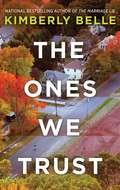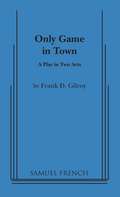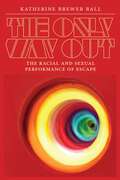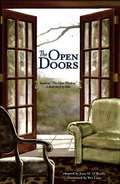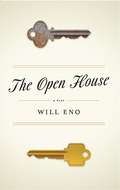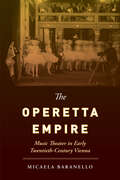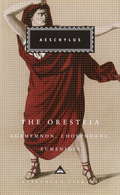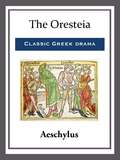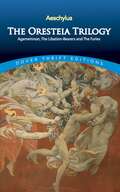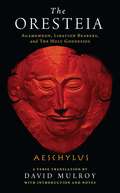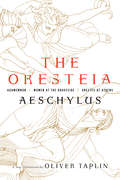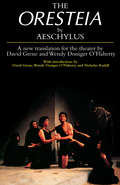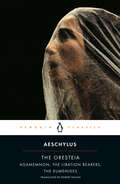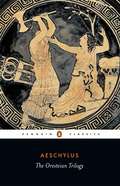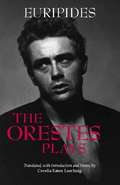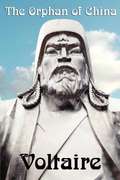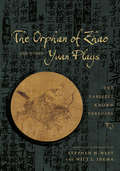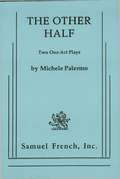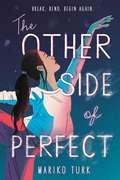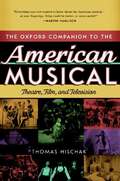- Table View
- List View
The One King Lear
by Sir Brian VickersIn the 1980s influential scholars argued that Shakespeare revised King Lear in light of theatrical performance, resulting in two texts by the bard’s own hand. The two-text theory hardened into orthodoxy. Here Sir Brian Vickers makes the case that Shakespeare did not cut his original text. At stake is the way his greatest play is read and performed.
The Ones We Trust (Mira Ser.)
by Kimberly BelleFrom the internationally bestselling author of The Marriage Lie comes a riveting exploration of grief and guilt in the wake of one family&’s shocking loss.When former DC journalist Abigail Wolff attempts to rehabilitate her career, she finds herself at the heart of a shocking conspiracy involving the death of a soldier in Afghanistan. This loss has unspeakable emotional consequences for the family and as news of what happened comes to light, Abigail will stop at nothing to write the story.As she stumbles upon more and more evidence in the case, it seems there are fewer and fewer people she can trust…including her own father, a retired army general. Stunned by the revelations, she is equally surprised to find herself falling for the slain soldier&’s brother, Gabe, a bitter man struggling to hold his family together. Her investigation eventually leads her to an impossible choice, one of unrelenting sacrifice to protect those she loves.Beyond the buried truths and betrayals, questions of family loyalty and redemption, Abigail&’s search is, most of all, a desperate grasp to carry on—and seek hope in the impossible. In this emotionally gripping story, Kimberly Belle has penned an unforgettable narrative and a true testament to the meaning of trust.Originally published in 2015.Don't miss bestselling author Kimberly Belle's next deeply addictive thriller, The Personal Assistant—where she explores the dark side of the digital world when a mommy-blogger&’s assistant goes missing!Look for these other pulse-pounding thrillers by Kimberly Belle: The Marriage Lie The Last Breath Stranger in the Lake My Darling Husband Three Days Missing Dear Wife
The Only Game in Town
by Frank D. GilroyDramatic Comedy / 2m, 1f / The author of The Subject Was Roses here turns his attention in this play to that fascinating arena of romance and broken dreams known as Las Vegas. The title is a trenchant comment on both gambling and love. The scene opens with a piano player and a chorine entering her apartment shortly after meeting two lonely wayward souls adrift in the world. He, it turns out, is a compulsive gambler just biding his time till he gets the bankroll with which he plans to make his fortune at the wheels, while she has a fixation about unattainable men. While he is waiting for his kitty to grow and she is waiting for her married suitor to come and rescue her, they both fall in love. When the suitor finally arrives, she shows him the gate; and when the kitty finally swells to $3600, the piano player loses it quickly only to hock his watch, start over, and amass the bundle he always knew was his. A fond and humorous romance.
The Only Way Out: The Racial and Sexual Performance of Escape
by Katherine Brewer BallIn The Only Way Out, Katherine Brewer Ball explores the American fascination with the escape story. Brewer Ball argues that escape is a key site for exploring American conceptions of freedom and constraint. Stories of escape are never told just once but become mythic in their episodic iterations, revealing the fantasies and desires of society, the storyteller, and the listener. While white escape narratives have typically been laden with Enlightenment fantasies of redemption where freedom is available to any individual willing to seize it, Brewer Ball explores how Black and queer escape offer forms of radical possibility. Drawing on Black studies, queer theory, and performance studies, she examines a range of works, from nineteenth-century American literature to contemporary queer of color art and writing by contemporary American artists including Wilmer Wilson IV, Tourmaline, Tony Kushner, Junot Díaz, Glenn Ligon, Toshi Reagon, and Sharon Hayes. Throughout, escape emerges as a story not of individuality but of collectivity and entanglement.
The Open Doors (Fountas & Pinnell LLI Purple #Level R)
by Jane O'ReillyThe Open Doors based on "The Open Window," a short story by Saki
The Open House
by Will Eno"Mr. Eno has established himself as one of the most vital, distinctive voices in the American theater over the past decade. Once encountered, his style is not likely to be forgotten: Wryly humorous and deeply engaged in the odd kinks and quirks of language and its fuzzy relationship to meaning, his plays are also infused with a haunted awareness of, and a sorrowful compassion for, the fundamental solitude of existence." -New York Times"An anarchic and deliciously clever play." -Huffington PostThis wildly funny and subversive take on the archetypal family drama is dense with authentic feeling and pain and it ultimately evolves into something haunted and mysterious and grand, even hopeful. The Open House won a Drama Desk Award, the 2014 Obie Award for Playwriting and the 2014 Lucille Lortel Award for Outstanding Play. It was on the Top Ten Plays of 2014 lists of TIME magazine, Time Out New York and the NY Daily News. Will Eno is the author of The Realistic Joneses and Thom Pain (based on nothing) , which was a Pulitzer Prize finalist. Other works include Middletown, The Flu Season, Tragedy: a tragedy, Intermission and Gnit. He is a Residency Five Fellow at Signature Theatre in New York. His many awards include the PEN/Laura Pels Award, the Horton Foote Prize and the first-ever Marian Seldes/Garson Kanin Fellowship by the Theater Hall of Fame.
The Operetta Empire: Music Theater in Early Twentieth-Century Vienna
by Micaela Baranello"When the world comes to an end," Viennese writer Karl Kraus lamented in 1908, "all the big city orchestras will still be playing The Merry Widow." Viennese operettas like Franz Lehár's The Merry Widow were preeminent cultural texts during the Austro-Hungarian Empire's final years. Alternately hopeful and nihilistic, operetta staged contemporary debates about gender, nationality, and labor. The Operetta Empire delves into this vibrant theatrical culture, whose creators simultaneously sought the respectability of high art and the popularity of low entertainment. Case studies examine works by Lehár, Emmerich Kálmán, Oscar Straus, and Leo Fall in light of current musicological conversations about hybridity and middlebrow culture. Demonstrating a thorough mastery of the complex early twentieth-century Viennese cultural scene, and a sympathetic and redemptive critique of a neglected popular genre, Micaela Baranello establishes operetta as an important element of Viennese cultural life—one whose transgressions helped define the musical hierarchies of its day.
The Oresteia
by Aeschylus George Thomson Richard SeafordOne of the founding documents of Western culture and the only surviving ancient Greek trilogy, the Oresteia of Aeschylus is one of the great tragedies of all time.The three plays of the Oresteia portray the bloody events that follow the victorious return of King Agamemnon from the Trojan War, at the start of which he had sacrificed his daughter Iphigeneia to secure divine favor. After Iphi-geneia's mother, Clytemnestra, kills her husband in revenge, she in turn is murdered by their son Orestes with his sister Electra's encouragement. Orestes is pursued by the Furies and put on trial, his fate decided by the goddess Athena. Far more than the story of murder and ven-geance in the royal house of Atreus, the Oresteia serves as a dramatic parable of the evolution of justice and civilization that is still powerful after 2,500 years.The trilogy is presented here in George Thomson's classic translation, renowned for its fidelity to the rhythms and richness of the original Greek.(Book Jacket Status: Jacketed)
The Oresteia
by AeschylusAeschylus was the first of the three ancient Greek tragedians whose plays can still be read or performed, the others being Sophocles and Euripides. He is often described as the father of tragedy: our knowledge of the genre begins with his work and our understanding of earlier tragedies is largely based on inferences from his surviving plays. Only seven of his estimated seventy to ninety plays have survived into modern times. Fragments of some other plays have survived in quotes and more continue to be discovered on Egyptian papyrus, often giving us surprising insights into his work.
The Oresteia Trilogy: Agamemnon, the Libation-Bearers and the Furies (Dover Thrift Editions Ser.)
by AeschylusClassic trilogy by great tragedian deals with the bloody history of the House of Atreus. Grand in style, rich in diction and dramatic dialogue, the plays embody Aeschylus' concerns with the destiny and fate of both individuals and the state, all played out under the watchful eye of the gods.
The Oresteia: Agamemnon, Libation Bearers, and The Holy Goddesses (Wisconsin Studies in Classics)
by Aeschylus David MulroyFirst presented in the spring of 458 B.C.E. at the festival of Dionysus in Athens, Aeschylus' trilogy Oresteia won the first prize. Comprised of three plays—Agamemnon, Libation Bearers, and The Furies—it is the only surviving example of the ancient trilogy form for Greek tragedies. This drama of the House of Atreus catches everyone in a bloody net. Queen Clytaemestra of Argos murders her husband Agamemnon. Their son Orestes avenges his father by killing his mother. The Furies, hideous deities who punish the murder of blood kin, pursue Orestes. Into this horrific cycle steps Athena, goddess of wisdom, who establishes the rule of law to replace fatal vengeance. Orestes is tried in court before a jury of Athenians and found not guilty. Athena transforms the Furies into benevolent goddesses and extols the virtue of mercy. An important historical document as well as gripping entertainment, the Oresteia conveys beliefs and values of the ancient Athenians as they established the world's first great democracy. Aeschylus (525/4–456/5 B.C.E.) was the first of the three great tragic dramatists of ancient Greece, forerunner of Sophocles and Euripides. In this trilogy he created a new dramatic form with characters and plot, infused with spellbinding emotion. David Mulroy's fluid, accessible English translation with its rhyming choral songs does full justice to the meaning and theatricality of the ancient Greek. In an introduction and appendixes, he provides cultural background for modern readers, actors, and students.
The Oresteia: Agamemnon, Women At The Graveside, Orestes In Athens
by Aeschylus Oliver TaplinThis spellbinding, groundbreaking translation reenergizes Aeschylus’ enduring saga of split loyalties, bloody sacrifice, and the efforts to bring peace after generations of strife. The most renowned of Aeschylus’ tragedies and one of the foundational texts of Western literature, the Oresteia trilogy is about cycles of deception and brutality within the ruling family of Argos. In Agamemnon, afflicted queen Clytemnestra awaits her husband’s return from war to commit a terrible act of retribution for the murder of her daughter. The next two plays, radically retitled here as The Women at the Graveside and Orestes in Athens, deal with the aftermath of the regicide, Orestes’ search to avenge his father’s death, and the ceaseless torment of the young prince. A powerful discourse on the formation of democracy after a period of violent chaos, The Oresteia has long illuminated the tensions between loyalty to one’s family and to the greater community. Now, Oliver Taplin’s “vivid and accessible translation” (Victoria Mohl) captures the lyricism of the original, in what is sure to be a classic for generations to come.
The Oresteia: Agamemnon, Women At The Graveside, Orestes In Athens (Oleander Language And Literature Ser. #Vol. 18)
by AeschylusHighly acclaimed as translators of Greek and Sanskrit classics, respectively, David Grene and Wendy Doniger O'Flaherty here present a complete modern translation of the three plays comprising Aeschylus' Orestia and, with the assistance of director Nicholas Rudall, an abridged stage adaptation. This blanced and highly successful collaboration of scholars with a theater director solves the contemporary problems of translating and staging the Orestia, which originally was written to be performed in Athens in the first half of the fifth century B.C. While remaning faithful to the original Greek, Grene and O'Flaherty embrace a strong and adventurous English style, vivid and visceral. The language of this extraordinary translation, immediately accessible to a theater audience, speaks across the centuries. Premiered at Chicago's Court Theater in 1986 under Rudall's direction, the stage adaptation of the Orestia proved eminently playable. This new adaptation of the orestia offers a brilliant demonstration of how clearly defined goals (here, the actor's needs) can inspire translators to produce fresh, genuine, accessible dramatic texts. The resulting work provides complete and accurate texts for those who cannot read the original Greek, and it transforms the Orestia into an effective modern stage play. With interpretive introductions written by the translators and director, this new version will be welcomed by teachers of translation courses, by students of Greek and world drama in general, and by theater professionals.
The Oresteia: Agamemnon; The Libation Bearers; The Eumenides (Oleander Language And Literature Ser. #Vol. 18)
by Robert Fagles Aeschylus W. B. StanfordOne of the founding documents of Western culture and the only surviving ancient Greek trilogy, the Oresteia of Aeschylus is one of the great tragedies of all time.The three plays of the Oresteia portray the bloody events that follow the victorious return of King Agamemnon from the Trojan War, at the start of which he had sacrificed his daughter Iphigeneia to secure divine favor. After Iphi-geneia's mother, Clytemnestra, kills her husband in revenge, she in turn is murdered by their son Orestes with his sister Electra's encouragement. Orestes is pursued by the Furies and put on trial, his fate decided by the goddess Athena. Far more than the story of murder and ven-geance in the royal house of Atreus, the Oresteia serves as a dramatic parable of the evolution of justice and civilization that is still powerful after 2,500 years.The trilogy is presented here in George Thomson's classic translation, renowned for its fidelity to the rhythms and richness of the original Greek.(Book Jacket Status: Jacketed)
The Oresteian Trilogy
by AeschylusAeschylus (525-c.456 bc) set his great trilogy in the immediate aftermath of the Fall of Troy, when King Agamemnon returns to Argos, a victor in war. Agamemnon depicts the hero's discovery that his family has been destroyed by his wife's infidelity and ends with his death at her callous hand. Clytemnestra's crime is repaid in The Choephori when her outraged son Orestes kills both her and her lover. The Eumenides then follows Orestes as he is hounded to Athens by the Furies' law of vengeance and depicts Athene replacing the bloody cycle of revenge with a system of civil justice. Written in the years after the Battle of Marathon, The Oresteian Trilogy affirmed the deliverance of democratic Athens not only from Persian conquest, but also from its own barbaric past.
The Orestes Plays
by Euripides Cecelia Eaton LuschnigFeaturing Cecelia Eaton Luschnig's annotated verse translations of Euripides' Electra, Iphigenia among the Tauri, and Orestes, this volume offers an ideal avenue for exploring the playwright's innovative treatment of both traditional and non-traditional stories concerning a central, fascinating member of the famous House of Atreus.
The Origin and Early Form of Greek Tragedy
by Gerald F. ElseThe Martin Lectures have a proud tradition of humanistic scholarship in the classical field.
The Orphan of China
by VoltaireThe Chinese tragedy, which they call "The Orphan," was taken out of an immense collection of the theatrical performances of that nation, which has cultivated this art for about three thousand years before it was invented by the Greeks, the art of making living portraits of the actions of men, establishing schools of morality, and teaching virtue in dialogue and representation. For a long time dramatic poetry was held in esteem only in that vast country of China, separated from and unknown to the rest of the world, and in the city of Athens. Rome was unacquainted with it till above four hundred years afterwards. If you look for it among the Persians, or Indians, who pass for an inventive people, you will not find it there; it has never yet reached them. Asia was contented with the fables of Palpay and Lokman, which contain all their morality, and have instructed by their allegories every age and nation.-Voltaire Wilder Publications is a green publisher. All of our books are printed to order. This reduces waste and helps us keep prices low while greatly reducing our impact on the environment.
The Orphan of Zhao and Other Yuan Plays
by Wilt L. Idema Stephen H. WestThe zaju in this volume explore the consequences of loyalty and betrayal, ambition and enlightenment, and piety and drunkenness.
The Orphan of Zhao and Other Yuan Plays: The Earliest Known Versions (Translations from the Asian Classics)
by Stephen West Wilt IdemaThis is the first anthology of Yuan-dynasty zaju (miscellaneous comedies) to introduce the genre to English-speaking readers exclusively through translations of the plays' fourteenth-century editions. Almost all previous translations of Yuan-dynasty zaju are based on late-Ming regularized editions that were heavily adapted for performance at the Ming imperial court and then extensively revised in the seventeenth century for the reading pleasure of Jiangnan literati. These early editions are based on leading actor scripts and contain arias, prose dialogue, and cue lines. They encompass a fascinating range of subject matter, from high political intrigue to commoner life and religious conversion. Crackling with raw emotion, violent imagery, and colorful language and wit, the zaju in this volume explore the consequences of loyalty and betrayal, ambition and enlightenment, and piety and drunkenness. The collection features seven of the twenty-six available untranslated zaju published in the fourteenth century, with a substantial introduction preceding each play and extensive annotations throughout. The editors also include translations of the Ming versions of four of the included plays and an essay that synthesizes recent Chinese and Japanese scholarship on the subject.
The Other Half
by Michele PalermoCollection of two one act plays: Labor Pains and A New York Minute
The Other Side of Perfect
by Mariko TurkFor fans of Sarah Dessen and Mary H.K. Choi, this lyrical and emotionally driven novel follows Alina, a young aspiring dancer who suffers a devastating injury and must face a world without ballet—as well as the darker side of her former dream. Alina Keeler was destined to dance, but then a terrifying fall shatters her leg—and her dreams of a professional ballet career along with it.After a summer healing (translation: eating vast amounts of Cool Ranch Doritos and binging ballet videos on YouTube), she is forced to trade her pre-professional dance classes for normal high school, where she reluctantly joins the school musical. However, rehearsals offer more than she expected—namely Jude, her annoyingly attractive castmate she just might be falling for.But to move forward, Alina must make peace with her past and face the racism she experienced in the dance industry. She wonders what it means to yearn for ballet—something so beautiful, yet so broken. And as broken as she feels, can she ever open her heart to someone else?Touching, romantic, and peppered with humor, this debut novel explores the tenuousness of perfectionism, the possibilities of change, and the importance of raising your voice.
The Ovidian Vogue
by Daniel D. MossThe Roman poet Ovid was one of the most-imitated classical writers of the Elizabethan age and a touchstone for generations of English writers. In The Ovidian Vogue, Daniel Moss argues that poets appropriated Ovid not just to connect with the ancient past but also to communicate and compete within late Elizabethan literary culture.Moss explains how in the 1590s rising stars like Thomas Nashe and William Shakespeare adopted Ovidian language to introduce themselves to patrons and rivals, while established figures like Edmund Spenser and Michael Drayton alluded to Ovid's works as a way to map their own poetic development. Even poets such as George Chapman, John Donne, and Ben Jonson, whose early work pointedly abandoned Ovid as cliché, could not escape his influence. Moss's research exposes the literary impulses at work in the flourishing of poetry that grappled with Ovid's cultural authority.
The Oxford Companion to American Theatre
by Gerald BordmanAn abridgment of the massive original volume (1984), eliminating many entries on minor plays and figures but preserving those articles that are of the widest general interest. In addition, this volume updates information on contemporary topics and includes a number of new articles. Some 2,000 entries, accessibly arranged in a two-column, A-Z format.
The Oxford Companion to the American Musical: Theatre, Film, and Television
by Thomas S. HischakFrom the silver screen to the Great White Way, small community theatres to television sets, the musical has long held a special place in America's heart and history. Now, in The Oxford Companion to the American Musical, readers who flocked to the movies to see An American in Paris or Chicago, lined up for tickets to West Side Story or Rent, or crowded around their TVs to watch Cinderella or High School Musical can finally turn to a single book for details about them all. For The first time, this popular subject has an engaging and authoritative book as thrilling as the performances themselves. With more than two thousand entries, this illustrated guide offers a wealth of information on musicals, performers, composers, lyricists, producers, choreographers, and much more. Biographical entries range from early stars Fred Astaire, Bing Crosby, Mary Martin, and Mae West to contemporary show-stoppers Nathan Lane, Savion Glover, and Kristin Chenoweth, while composers Irving Berlin, George Gershwin, Richard Rodgers, and Andrew Lloyd Webber all have articles, and the choreography of Bob Fosse, Tommy Tune, and Debbie Allen receives due examination. The plays and films covered range from modern hits like Mamma Mia! and Moulin Rouge! to timeless classics such as Yankee Doodle Dandy and Show Boat. Also, numerous musicals written specifically for television appear throughout, and many entries follow a work--Babes in Toyland for example--as it moves across genres, from stage, to film, to television. The Companion also includes cross references, a comprehensive listing of recommended recordings and further reading, a useful chronology of all the musicals described in the book, plus a complete index of Tony Award and Academy Award winners. Whether you are curious about Singin' in the Rain or Spamalot, or simply adore The Wizard of Oz or Grease, this well-researched and entertaining resource is the first place to turn for reliable information on virtually every aspect of the American musical. THOMAS HISCHAK is Professor of Theatre at the State University of New York College at Cortland. He is the author of sixteen books on theatre, film, and popular music, including The Oxford Companion to American Theatre; the textbook Theatre as Human Action; and the award-winning American Musical Theatre Song Encyclopedia. He is also the author of twenty published plays.

